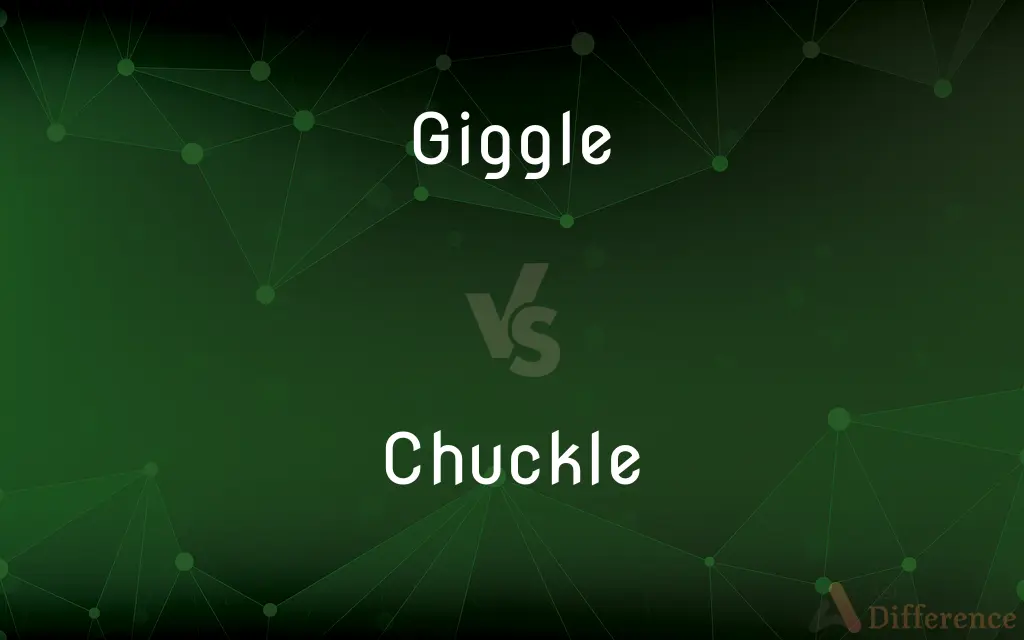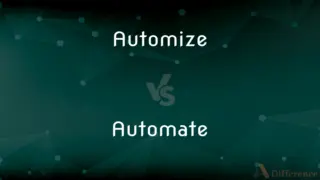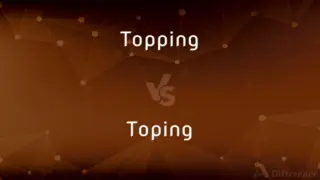Giggle vs. Chuckle — What's the Difference?
By Tayyaba Rehman & Fiza Rafique — Updated on March 8, 2024
A giggle is a light, often high-pitched, repetitive sound of amusement, typically softer and more restrained. A chuckle is a quiet, low-pitched laughter sound, reflecting amusement or mild amusement, usually more controlled than a giggle.

Difference Between Giggle and Chuckle
Table of Contents
ADVERTISEMENT
Key Differences
Giggles are often spontaneous and can be triggered by nervousness or amusement. They are characterized by their light, airy quality and can be somewhat uncontrollable, often seen as a more feminine form of laughter. Giggles are common among close friends or in situations where outright laughter might be deemed inappropriate. Chuckles, on the other hand, denote a more subdued form of laughter. They are deeper in tone and suggest a level of amusement that is less overt than giggling. Chuckles are often seen as more mature and are typically not as infectious as giggles.
The social context in which giggles and chuckles are found can also differ. Giggles are more likely to occur in social settings, among groups of friends sharing a joke or a secret. They have a way of lightening the atmosphere and can be contagious, leading to a shared sense of enjoyment among the group. Chuckles, while also social, can be more solitary in nature. It’s not uncommon for someone to chuckle to themselves upon remembering something amusing or when amusement is found in a situation that is not overtly funny to others.
Giggling might involve more facial and body movements compared to chuckling. Giggles can lead to tears, snorting, or even a slight loss of control, reflecting a higher degree of amusement or a nervous reaction. Chuckles are more controlled, involving minimal facial and body movement, and reflect a level of amusement that is acknowledged internally more than it is expressed outwardly.
From an emotional perspective, giggles can indicate a variety of states including amusement, nervousness, or even embarrassment. They are more likely to be associated with light-hearted, playful situations. Chuckles, on the other hand, often come from a place of wisdom or experience, reflecting amusement at something that might not be immediately obvious to everyone. They can also express a personal, internal reaction to humor or irony.
In terms of frequency and duration, giggles tend to be shorter and can occur in quick successions, often hard to control once they start. Chuckles are usually singular or occur in brief sequences, with a clear beginning and end, and are easier to control. This makes chuckles appear more deliberate and measured compared to the sometimes uncontrollable nature of giggles.
ADVERTISEMENT
Comparison Chart
Sound
Light, high-pitched, and repetitive
Quiet, low-pitched, and short
Trigger
Amusement, nervousness, light-hearted moments
Mild amusement, irony, personal humor
Social Context
Common in groups, infectious, can lighten the atmosphere
Can be solitary or social, more subdued
Physiology
Involves more facial and body movements, can lead to tears
Minimal movement, more controlled
Emotional Indication
Amusement, nervousness, embarrassment
Amusement, wisdom, experience
Frequency and Duration
Short, often uncontrollable, quick successions
Singular or brief sequences, controlled
Compare with Definitions
Giggle
A light, often high-pitched laughter indicating amusement or nervousness.
The joke made her giggle uncontrollably.
Chuckle
Reflects a level of amusement not necessarily shared or obvious to others.
His chuckle hinted at a deeper understanding of the joke.
Giggle
Sometimes uncontrollable, reflecting spontaneous amusement.
Her attempt to stop giggling only made her giggle more.
Chuckle
Can express wisdom or experience through a gentle form of laughter.
The grandfather chuckled at the children's antics, remembering his own.
Giggle
Often occurs in social settings, contributing to a shared sense of joy.
The room was filled with giggles at the story.
Chuckle
Often a solitary response to personal amusement or internal thoughts.
Recalling the incident, he couldn't help but chuckle to himself.
Giggle
Can be a response to playful teasing or light-hearted moments.
Their playful banter was punctuated with giggles.
Chuckle
A quiet, low-pitched sound of laughter, showing mild amusement.
He chuckled at the clever pun in the book.
Giggle
Characterized by being softer, suggesting restrained amusement.
She let out a giggle during the serious presentation.
Chuckle
More controlled and subdued than a giggle, indicating a mature sense of humor.
She chuckled softly, finding the irony in the situation.
Giggle
To laugh with repeated short, spasmodic sounds.
Chuckle
To laugh quietly or to oneself.
Giggle
To utter while giggling.
Chuckle
To cluck or chuck, as a hen.
Giggle
A short, spasmodic laugh.
Chuckle
A quiet laugh of mild amusement or satisfaction.
Giggle
To laugh gently in a playful, nervous, or affected manner.
The jokes had them giggling like little girls all evening.
Chuckle
A quiet laugh.
Giggle
A high-pitched, silly laugh.
Chuckle
To laugh quietly or inwardly.
Giggle
(informal) Fun; an amusing episode.
We put itching powder down his shirt for giggles.
The women thought it would be quite a giggle to have a strippergram at the bride's hen party.
Chuckle
(transitive) To communicate through chuckling.
She chuckled her assent to my offer as she got in the car.
Giggle
To laugh with short catches of the breath or voice; to laugh in a light, affected, or silly manner; to titter with childish levity.
Giggling and laughing with all their mightAt the piteous hap of the fairy wight.
Chuckle
To make the sound of a chicken; to cluck.
Giggle
A kind of laugh, with short catches of the voice or breath; a light, silly laugh.
Chuckle
To call together, or call to follow, as a hen calls her chickens; to cluck.
Giggle
A foolish or nervous laugh
Chuckle
To fondle; to indulge or pamper.
Giggle
Laugh nervously;
The girls giggled when the rock star came into the classroom
Chuckle
(obsolete) Clumsy.
Chuckle
To call, as a hen her chickens; to cluck.
Chuckle
To fondle; to cocker.
Chuckle
To laugh in a suppressed or broken manner, as expressing inward satisfaction, exultation, or derision.
Chuckle
A short, suppressed laugh; the expression of satisfaction, exultation, or derision.
Chuckle
A soft partly suppressed laugh
Chuckle
Laugh quietly or with restraint
Common Curiosities
What is a giggle?
A light, often high-pitched sound of laughter indicating amusement or nervousness, typically seen as more spontaneous and uncontrollable.
What is a chuckle?
A quiet, low-pitched sound of laughter reflecting mild amusement or irony, seen as more controlled and mature.
When do people usually giggle?
During light-hearted moments, in social settings, or when feeling nervous or embarrassed.
Is chuckling considered more mature than giggling?
Yes, chuckles are often seen as reflecting a more mature or subdued sense of humor.
Do giggles involve more physical movement than chuckles?
Yes, giggling can involve more facial and body movements compared to the more controlled nature of chuckles.
Can a chuckle be a solitary expression of amusement?
Yes, people often chuckle to themselves upon remembering something amusing or when amused by personal thoughts.
What triggers a chuckle?
Mild amusement, personal humor, irony, or a deeper understanding of a situation.
Are giggles always a sign of happiness?
Not necessarily; they can also indicate nervousness or embarrassment in certain situations.
Can chuckles indicate wisdom or experience?
Yes, chuckles can reflect a deeper level of understanding or a reaction to something that resonates with personal experiences.
Can giggles be contagious?
Yes, giggles can be infectious and lead to a shared sense of enjoyment among groups.
Is it easier to control a chuckle than a giggle?
Yes, chuckles are generally more controlled and deliberate, while giggles can be spontaneous and harder to stop.
How do social contexts affect giggling and chuckling?
Giggles often enhance a shared social experience, while chuckles might be more reflective of individual amusement.
Can both giggles and chuckles lighten the mood?
Yes, both forms of laughter can contribute to a lighter atmosphere, though they may do so in different manners.
What does a chuckle say about someone’s sense of humor?
It suggests a personal, perhaps more nuanced appreciation of humor, irony, or wit.
Why might someone prefer to giggle instead of laugh out loud?
Giggling can be a more restrained way to express amusement, suitable in situations where loud laughter might be inappropriate.
Share Your Discovery

Previous Comparison
Automize vs. Automate
Next Comparison
Topping vs. TopingAuthor Spotlight
Written by
Tayyaba RehmanTayyaba Rehman is a distinguished writer, currently serving as a primary contributor to askdifference.com. As a researcher in semantics and etymology, Tayyaba's passion for the complexity of languages and their distinctions has found a perfect home on the platform. Tayyaba delves into the intricacies of language, distinguishing between commonly confused words and phrases, thereby providing clarity for readers worldwide.
Co-written by
Fiza RafiqueFiza Rafique is a skilled content writer at AskDifference.com, where she meticulously refines and enhances written pieces. Drawing from her vast editorial expertise, Fiza ensures clarity, accuracy, and precision in every article. Passionate about language, she continually seeks to elevate the quality of content for readers worldwide.
















































